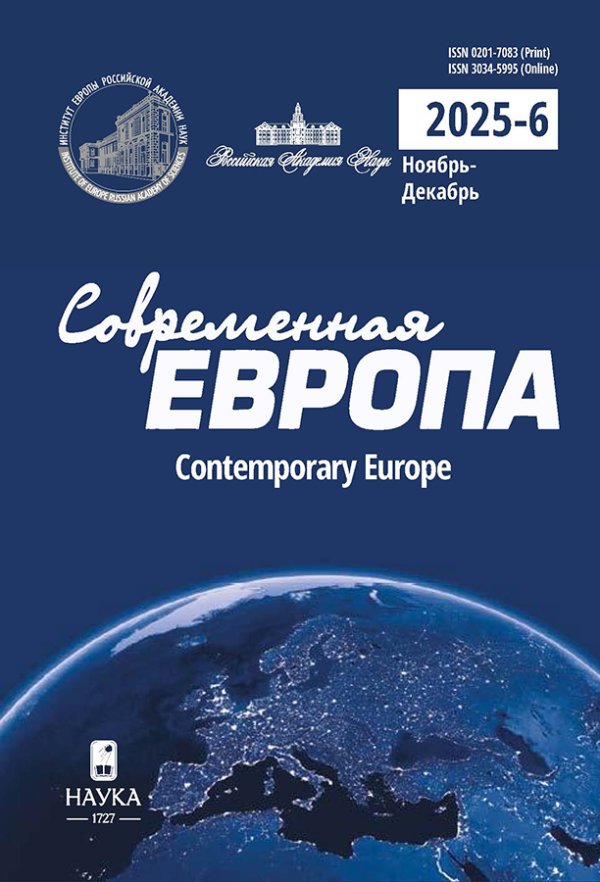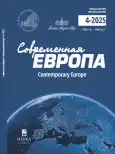МЕЙДЗИ ОТКРЫВАЕТ СТРАНУ
- Авторы: Носов М.Г1
-
Учреждения:
- Институт Европы Российской академии наук
- Выпуск: № 4 (132) (2025)
- Страницы: 203–217
- Раздел: СТРАНИЦЫ ИСТОРИИ
- URL: https://bakhtiniada.ru/0201-7083/article/view/308188
- DOI: https://doi.org/10.31857/S0201708325040175
- ID: 308188
Цитировать
Аннотация
К моменту падения сёгуната в 1868 г. Япония развивалась в изоляции от остального мира. Государство находилось в состоянии экономического и социального кризиса, что в первую очередь было связано с замедлением роста производительных сил и технологической отсталостью. Однако было бы несправедливо говорить, что 265 лет периода изоляции под властью семьи Токугава прошли для Японии вхолостую. Уже к началу XVIII в. Киото и Осака были в числе крупнейших городов мира, а Эдо с населением, превышавшим один миллион человек, был самым большим городом мира. Страна имела один из самых высоких в мире уровней грамотности, совершенную, хотя во многом и элитарную, культуру. Государство обеспечивало народ, хотя и не слишком высоким, но достаточно приемлемым уровнем жизни. В стране процветали ремесла и торговля, а политическая система медленно, но находилась в постоянном процессе модернизации. Главной движущейся силой Реставрации стало осознание неизбежности полного «открытия» страны, как под давлением иностранцев, так и в силу понимания технологического отставания Японии. Немалую роль в отказе от изоляции страны сыграли и события в Индии и Китае, где англичане и французы активно проводили колониальную политику. В Японии внимательно следили за событиями в Китае и искали способы избежать подобной участи. После долгих колебаний страна добровольно и целенаправленно решила пойти навстречу Европе и перестроить свою национальную жизнь по западному образцу. Самураи княжеств Сацума, Тесю и Тоса лидировали по числу нападений на иностранцев и на тех высокопоставленных японцев, которых они считали предателями страны за их уступки чужеземцам. Однако именно они в конечном итоге создали канал связи с иностранцами и в первую очередь с англичанами. Они раньше других установили связи с Европой, покупая у неё оружие, направляя молодых людей на учебу за границу. Весь период Мейдзи, ставший переломным в истории современной Японии, именно они от имени императора управляли страной. Образованные и начинавшие понимать Запад самураи объединились и приняли решение превратить Японию в сильное и современное государство, способное противостоять любому давлению извне. Как это ни парадоксально, но император Комэй (1831–1867), фактически возглавлявший движение «Сонно – Дзён» (восстановления императорской власти и изгнания иностранцев), объединил вокруг двора тех, кто в конечном итоге сверг сёгунат и открыл Японию для мира. Упразднив сёгунат, они формально не изменили политический строй страны, во главе которой оставался император, а создаваемая система управления в начале реформ основывалась на традиционных институтах власти.
Об авторах
М. Г Носов
Институт Европы Российской академии наук
Email: mikhailnosov@mail.ru
Член-корреспондент РАН Москва, Россия
Список литературы
- Ishizuki M. (1972) “Kindai Nihon-no kaigai rugakushi” (The history of Japanese students abroad). (История японских студентов за рубежом). Kyoto.
- Keen D. (2002) Emperor of Japan:Meiji and his World. Columbia Universityu Press. N.Y.
- Hazel J. (1980) Live Machines. University of British Columbia Press.
- Hommes J. (2004) The bansho shirabessho (Институт по изучению книг варваров) University of Pittsburgh.
- Meiji tenno ki. (1968) Император Мейдзи. Хроника. Vol. 1. Tokyo.
- Sansom G.B. (1950) The Western World and Japan. Alfred A. Knopf, Inc. N.Y.
- Satow E. (1921) A Diplomat in Japan. Seeley, L.
- Stead A. (1904) Japan by the Japanese. Heyneman, L.
Дополнительные файлы










